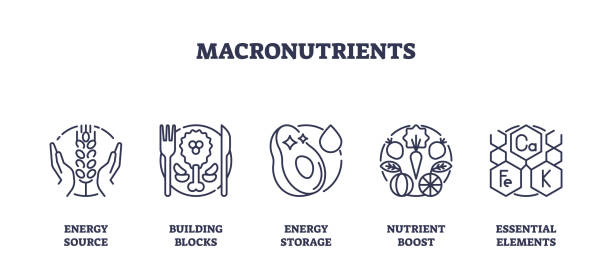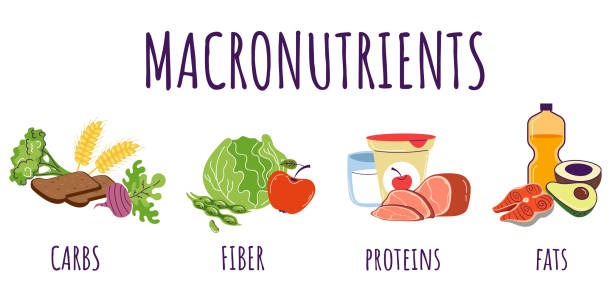
What Are Macronutrients? Fueling Your Body the Right Way
Have you ever wondered, “What are macronutrients?” If you’ve looked at a nutrition label or tried deciphering a diet plan, you’ve probably encountered this term. Simply put, macronutrients are the nutrients your body needs in large amounts to survive, thrive, and perform at its best. But there’s more to these mighty macros than meets the eye. Let’s break it down—with a dash of humor and a whole lot of useful info.
1. What Are Macronutrients? A Quick Overview
So, what are macronutrients? They’re the foundation of your diet, providing the energy your body needs to power through the day. There are three main types of macronutrients:
- Carbohydrates: Your body’s primary energy source. Think bread, rice, and pasta (or as keto fans call them, the enemy).
- Proteins: Essential for muscle repair, immune function, and keeping you full. Think meat, eggs, and legumes.
- Fats: Often misunderstood, fats are crucial for brain health, hormone production, and energy storage. Think avocados, nuts, and oils.
Each of these macros plays a unique role in keeping your body in tip-top shape, and striking the right balance is key to any successful diet plan.
2. What Are Macronutrients? Breaking Down Carbohydrates
Carbs often get a bad rap, but they’re not all evil. Let’s take a closer look at what carbs do and why they’re important (even if you’re on keto).
Simple vs. Complex Carbs
- Simple Carbs: Quick energy sources found in sugary snacks and processed foods. Think candy, soda, and desserts.
- Complex Carbs: Found in whole grains, vegetables, and legumes, these provide steady energy over time.
Role of Carbs:
- Fuel for Energy: Your body converts carbs into glucose, powering your brain and muscles.
- Quick Energy: Carbs are your go-to for immediate energy needs, like sprinting to catch a bus.
So, what are macronutrients’ role in carbs? It’s all about balance—too many can lead to weight gain, while too few can leave you sluggish.
3. What Are Macronutrients? Protein: The Body’s Repair Crew
Protein is often hailed as the king of macros, and for good reason. Whether you’re a gym rat or a couch potato, protein is crucial for keeping your body running smoothly.
Why You Need Protein:
- Muscle Repair: After a workout (or a rough day), protein helps rebuild muscle fibers.
- Enzymes and Hormones: Proteins are essential for producing enzymes and hormones that regulate bodily functions.
- Satiety: High-protein meals keep you feeling full longer, helping curb overeating.
Best Protein Sources:
- Animal-based: Chicken, beef, eggs, and fish.
- Plant-based: Lentils, chickpeas, tofu, and quinoa.
When it comes to answering what are macronutrients, protein is the overachiever that keeps your body strong and satisfied.

4. What Are Macronutrients? Fats: The Misunderstood Hero
Fats often get unfairly blamed for weight gain, but they’re a vital macronutrient your body can’t live without. Here’s why fats deserve a spot on your plate.
Types of Fats:
- Unsaturated Fats: The “good” fats found in avocados, nuts, and olive oil.
- Saturated Fats: Found in butter, cheese, and fatty cuts of meat. Moderation is key here.
- Trans Fats: Avoid these like the plague; they’re found in processed foods and linked to health issues.
Role of Fats:
- Brain Power: Your brain is made up of 60% fat, and it needs healthy fats to function.
- Energy Storage: When carbs are scarce, fats provide a long-lasting energy source.
- Nutrient Absorption: Certain vitamins (A, D, E, and K) are fat-soluble, meaning you need fat to absorb them.
Understanding what are macronutrients’ role in fats can help you make smarter dietary choices without fearing the fat.
5. What Are Macronutrients? Balancing Your Diet
Now that you know the roles of carbs, proteins, and fats, how do you balance them in your diet? The answer depends on your goals:
Weight Loss:
- Reduce carbs and increase protein and healthy fats to curb hunger and promote fat loss.
Muscle Building:
- Up your protein intake to support muscle repair and growth, while maintaining a moderate amount of carbs for energy.
General Health:
- Stick to a balanced approach: roughly 50% carbs, 25% protein, and 25% fats.
The beauty of macros is their flexibility. Once you understand what are macronutrients for your body’s needs, you can tweak your intake to suit your lifestyle.
Conclusion: Macro Mastery Made Simple
So, what are macronutrients? They’re the trio of nutrients—carbohydrates, proteins, and fats—that fuel your body, keep you healthy, and (let’s be real) make eating enjoyable. Whether you’re counting macros for fitness goals or just trying to understand your diet better, knowing how to balance these nutrients is key.
For more in-depth guides, tips, and tricks on navigating the world of macros and keto, visit Keto Sensation—the ultimate resource for all things keto. Have thoughts, questions, or hilarious macro-tracking mishaps? Share them in the comments below—we’d love to hear from you!